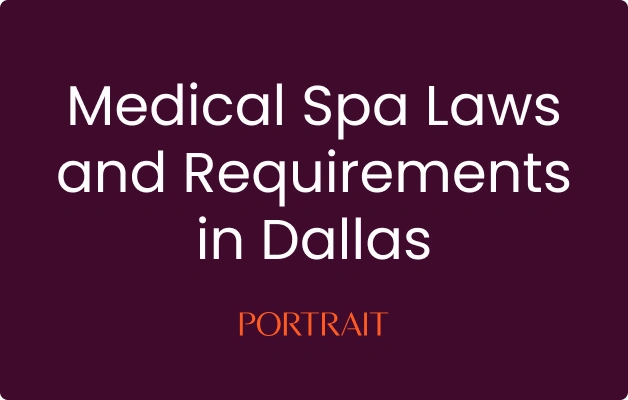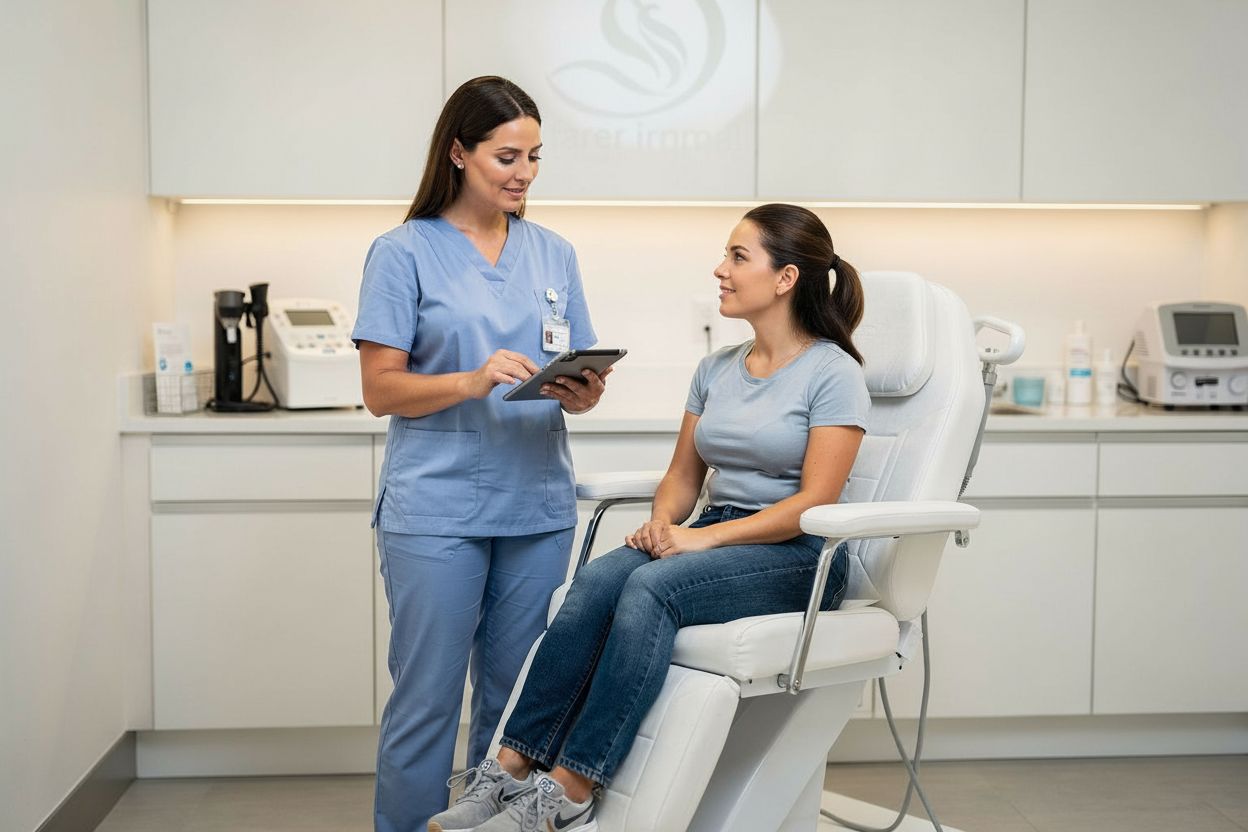Medical Spa Laws and Requirements in Dallas

Empowering Professionals at Every Stage
Portrait offers strategic expertise to help you make informed decisions and achieve long-term success.
Book Intro CallWhile Texas law does not provide a single definition for a medical spa, the Texas Department of Licensing and Regulation describes a medspa as a facility offering both aesthetic and non-surgical medical treatments. Compliance involves a complex mix of state agency rules and local ordinances, such as the Dallas city code for related establishments. Our guide provides the essential information you need to manage your practice confidently and meet all state and local requirements.
How Medical Spa Laws Work in Dallas
Understanding medical spa laws in Dallas begins with a key distinction, as no single legal definition for a “medical spa” exists in city or state code. The primary difference from a traditional day spa is that a med spa provides medical treatments, such as Botox or laser therapies, which must be performed under a physician's delegation. This framework is fundamental to med spa compliance and determines the specific medical spa requirements Dallas clinics must meet.
These distinct med spa regulations exist to protect patient safety, as the services offered are medical in nature. Consequently, several agencies oversee operations, making it crucial to know who can open a med spa and under what rules. The main governing bodies for spas in Dallas include the Texas Medical Board for medical acts, the Texas Department of Licensing and Regulation (TDLR) for esthetician and facility licenses, and the Texas Board of Nursing for nursing staff.
Medical Spa Requirements in Dallas
To help you operate with confidence, we will cover the essential requirements for medical spas in Dallas. This includes securing the correct facility and practitioner licenses from the Texas Department of Licensing and Regulation (TDLR) and adhering to the Texas Medical Board’s rules for physician delegation and supervision. We will also examine specific service regulations, like the new state laws for IV hydration therapy, and clarify the scope of practice for your staff to ensure complete med spa compliance. These details are critical for anyone determining who can open a med spa and how to manage it successfully.
Medical Spa Ownership & Business Structure Requirements in Dallas
Medical spa ownership laws in Dallas are shaped by the core principle that a licensed physician must direct all medical services. While state guidance does not specify who can own a med spa or dictate a required business entity, this rule means a physician must control all clinical operations. Understanding this framework is essential for proper med spa compliance and navigating the broader med spa regulations.
The physician’s role is critical for meeting the medical spa requirements Dallas clinics must follow. A licensed physician must oversee patient assessments and order all medical treatments, a rule reinforced by new IV therapy regulations. This physician can delegate tasks to qualified staff under adequate supervision, but must remain available for consultation and maintain clear delegation agreements.
Facility, Licensing, and Compliance Requirements in Dallas
Operating a compliant practice in Dallas means meeting several facility and operational obligations. Any business offering regulated cosmetology or esthetic services must secure an establishment license from the Texas Department of Licensing and Regulation (TDLR), which serves as the primary medical spa license in Dallas. These med spa regulations apply regardless of your business name, ensuring a consistent standard for all spas in Dallas.
Your facility must also adhere to specific safety and sanitation rules to maintain med spa compliance. The TDLR mandates that licensed establishments meet health and safety requirements, which include having running water and a restroom. Additionally, local rules like the Dallas city code outline sanitary requirements for related establishments, reinforcing the importance of a clean and safe environment.
Finally, proper documentation and risk management are key parts of the medical spa requirements Dallas clinics must follow. This includes maintaining updated patient consent forms and clear delegation agreements, especially with new laws for services like IV therapy. While specific state mandates for advertising or insurance are not always detailed, truthful advertising and adequate liability coverage are fundamental to sound business operations.
Who Can Perform Medical Spa Procedures in Dallas?
In Dallas, the scope of practice is defined by whether a service is cosmetic or medical. Licensed estheticians can perform cosmetic treatments that affect only the top layer of skin, but medical procedures require physician oversight. This distinction is fundamental to the medical spa laws in Dallas and is critical for med spa compliance.
Procedures like Botox, fillers, laser skin resurfacing, and microneedling that penetrates the dermis are all considered medical acts. Under Texas med spa regulations, these services must be delegated by a physician to a qualified licensed professional, such as a registered nurse (RN), physician assistant (PA), or nurse practitioner (NP). Estheticians and medical assistants are not permitted to perform these invasive treatments.
For IV hydration, a new state law effective in 2025 mandates that only an RN, PA, or NP can administer the therapy. A physician must provide adequate supervision, which requires them to be available for consultation but not necessarily on-site. This rule is a key part of the medical spa requirements Dallas clinics must prepare for, as unlicensed staff are strictly prohibited from administering IVs.
Laser & Energy Device Regulations in Dallas
In Texas, the use of lasers and other energy devices for treatments like skin resurfacing is considered a medical act, governed by state med spa regulations. According to the Texas Department of Licensing and Regulation, these procedures must be performed under the order and delegation of a licensed physician. This physician oversight is a cornerstone of the medical spa laws in Dallas and is essential for med spa compliance.
This means that for spas in Dallas, only a physician or a properly delegated professional like a nurse practitioner or physician assistant can operate these devices. Estheticians and cosmetology operators are explicitly not authorized to perform laser treatments. Fulfilling the medical spa requirements Dallas clinics face also involves ensuring practitioners have the appropriate training and any required state-specific licenses, such as those for laser hair removal.
Medical Spa Enforcement, Penalties & Risk Management in Dallas
Violating the medical spa laws in Dallas can result in significant penalties from multiple state agencies, including the Texas Medical Board and the TDLR. For spas in Dallas, failure to meet med spa regulations can lead to enforcement actions ranging from cease-and-desist orders and substantial fines to the suspension or revocation of professional licenses. Understanding these risks is the first step toward protecting your business and ensuring long-term med spa compliance.
Many violations stem from a few common missteps. To help you avoid these pitfalls, here are some of the most frequent mistakes we see clinics make:
- Improper delegation: Allowing unlicensed or unqualified staff, such as medical assistants or estheticians, to perform medical procedures like injectables or laser treatments.
- Unlicensed practice: Operating without the required TDLR establishment license or employing practitioners who lack the proper individual licenses.
- Inadequate supervision: Failing to have a physician properly delegate and supervise medical treatments, which is a core part of the medical spa requirements Dallas clinics must meet.
- Misleading advertising: Making false or unsubstantiated claims about treatments or staff qualifications.
At Portrait Care, we believe proactive risk management is your best defense. Building a strong compliance framework not only protects you from penalties but also builds patient trust. Here are some essential best practices for staying compliant:
- Conduct regular compliance audits: Periodically review your protocols, documentation, and staff credentials to ensure they align with current med spa regulations.
- Invest in staff training: Provide ongoing education on scope of practice, safety protocols, and the specific rules governing the services you offer.
- Maintain meticulous documentation: Keep detailed records of patient consents, physician delegation agreements, and staff training to demonstrate your commitment to med spa compliance.
Stay Compliant with Portrait Care in Dallas
Operating a compliant medical spa in Dallas requires careful attention to physician oversight, facility licensing, and staff qualifications. As we've covered, all medical treatments must be delegated by a licensed physician, your clinic needs a TDLR establishment license, and only qualified professionals can perform procedures like injectables and laser treatments. By focusing on these core requirements and implementing strong risk management practices, you can build a practice founded on safety and trust. To get started, you can learn more about opening a compliant med spa with our detailed guide.
This content is for informational purposes only and is not a substitute for legal advice. We encourage you to consult with a qualified healthcare attorney to address your specific compliance questions.
Discover how our all-in-one platform provides the technology and support to help you grow with confidence. Schedule a demo with Portrait Care today.
One Platform.
Everything You Need.
Everything You Need.
Portrait combines the technology, support, and savings to run and scale your modern medical wellness business.
Book Intro Call
Stay Connected with Portrait Care
Subscribe to our email list and receive the latest insights, updates, and exclusive content delivered straight to your inbox.





